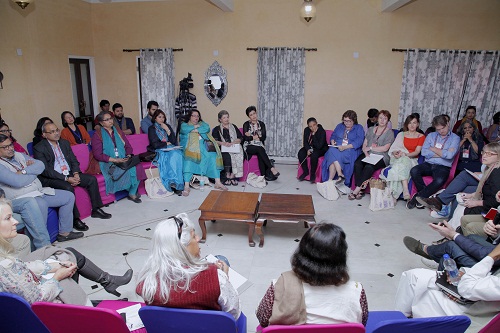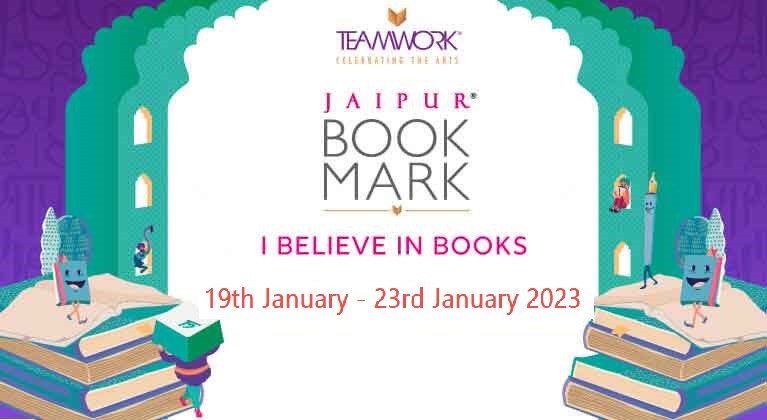
Festival Directors Roundtable
Alexandra Büchler, Ameena Saiyid,Cathy McCullough, Chandra Prakash Tiwari, Cherilyn Parsons, David McWilliams, Geoffrey Taylor, Janhavi Prasada, Kathryn Baird, Maina Bhagat,Meenakshi Alimchandani, Mita Kapur, Namita Gokhale, Oliver Møystad, Prashant Kashyap,Ravi Deecee, Sanaz Fotouhi, Sian Smyth, Smita Parikh, and Shyam Parikh moderated by Sanjoy K. Roy
by Archita Mittra, Official ZEE Jaipur Literature Festival Blogger
Can literary festivals change the world?
The short answer is yes.
But the real question is: how?
A panel comprising of eminent directors and organizers of various cultural festivals worldwide came up with some interesting answers, while discussing the impact of their respective events in a roundtable session at Jaipur Bookmark 2018.
For Sanjoy K. Roy, Festival Producer of ZEE Jaipur Literature Festival, it was a matter of reaching out to people irrespective of their economic backgrounds, but with a special focus on underprivileged children who lack the resources and education to improve their position in life. To that end, JLF has endeavoured to reach out to over “120 schools from economically backward areas.” They conducted a one-week workshop where children from such backgrounds met with “mainstream” school kids and were afforded the opportunity of “discovering each other’s worlds.” As Roy stated, “The sentiment of India lies with the young” and it is no surprise that the majority of people who attend JLF regularly are under the age of 25.
Another way of engaging children with the literature and heritage of their culture, is to organize “travelling” literary festivals for them – a strategy taken up by Ameena Saiyid, who is associated with the Karachi Literature Festival, among others. She recounted an instance about a child who had come to a literature festival and asked a speaker, “How can I speak English as well as you do?” Inspired by the ZEE Jaipur Literature Festival, she started organizing literary festivals catering exclusively to children all over Pakistan. The last session, which took place at Lahore Fort, was attended by over 25,000 children.
Audiences at literary fests are usually diverse and can be very fickle, according to Chandra Prakash Tiwari, a cultural activist who learned this the hard way. Tiwari recounted that when he had decided to use temples as venue spaces, it was met with a backlash from the villagers who initially found it strange that “religious” spaces were being used for seemingly non-religious events. Moreover, difficulties with logistics and funding made it almost impossible for him to market his events. But he refused to give up. He rode a bullock cart all through the village, publicizing the programme and was overwhelmed when instead of a few hundred people, over 10,500 people showed up to attend the sessions.
Of course literary festivals do not always have to be “huge” or “international” to be a success. For peace activist Janhavi Prasada, “literature, art, conservation, wildlife and sustainable living are all issues that must be addressed.” Like Saiyid, she too chose to “emulate JLF,” but in her own way. She played a crucial role in organizing small, “very intimate” lit fests in Nainital, attended by 50-200 people, so that readers and writers could have a one-on-one interaction. On the suggestion of Namita Gokhale, Festival Co-Director of the ZEE Jaipur Literature Festival, a book club was started to “bring closet readers out into the open.” They even have a special award called the “Jewel of Kumaon,” where ordinary people who have impacted the local community in extraordinary ways, are recognized and celebrated.
Similarly, lit-fests are important spaces to recognize writers from marginalized communities. Mita Kapur, CEO of Siyahi, began organizing lit-fests in Bhutan with the sole purpose of “digging out Bhutanese writers” and giving them a platform. Thanks to her efforts, Bhutanese publishing has gone up by 40%. Moreover, school principals have opened book clubs for students, monthly poetry readings are organized and the exchange of oral traditions has increased.
However, even with the best of intentions, lit-fests do also play into a capitalist consumerist economy. Maina Bhagat, Director of the Apeejay Kolkata Literary Festival, pointed out that audiences at lit-fests often “cannot afford the books” by their favorite writers at the festival bookstores, and yet “they know all about the writers and panelists.” Thus, it is important to cater to such a “diverse and informed audience” and improve and evolve their access, year on year.
What is certain is that literature festivals will continue to remain relevant in society – as platforms that celebrate well-known and less-famous writers equally, as spaces for readers and writers to interact effectively, promoting and preserving art, literature and the heritage of diverse cultures, and spreading awareness and knowledge among those who lack the necessary resources. In short, they impact the community in a thousand different ways.






